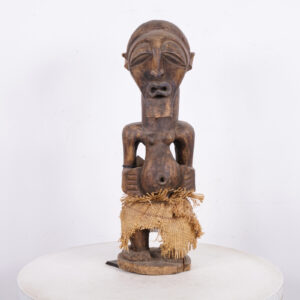“During the 16th century, the Songye migrated from the Shaba area, which is now the Democratic Republic of Congo (formerly Zaire), and settled on the left bank of the Lualaba River, on a savannah and forest-covered plateau. Divided into numerous sub-groups, the 150,000 Songye people are governed by a central chief, the Yakitenge, whose role demands that he obey special restrictive laws such as not showing grief, not drinking in public and not shaking hands with men. In addition, local rulers, the Sultani Ya Muti, distribute plots of land to their villagers and an influential secret society, Bwadi Bwa Kifwebe, counterbalances their power. Unlike their neighbors, the Luba, the Songye tribe is a patriarchal society in which agriculture is central to the economy.”
Source:
Baquart, Jean-Baptiste. The Tribal Arts of Africa. New York: Thames and Hudson Inc. 1998. Print.


